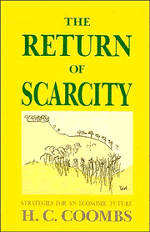Book contents
- Frontmatter
- Contents
- Introduction
- 1 Towards a Sustainable Society
- 2 Scarcity, Wealth and Income
- 3 Matching Ecological and Economic Realities
- 4 Science and Technology - For What Purpose?
- 5 Economic and Ecological Issues in Resource Management
- 6 Resource Management and Environmental Law
- 7 The Quality of life and Its Assessment
- 8 Is Democracy Alive and Well?
- 9 Technology, Economic Change and Political Strategy
- Bibliography
4 - Science and Technology - For What Purpose?
Published online by Cambridge University Press: 05 August 2012
- Frontmatter
- Contents
- Introduction
- 1 Towards a Sustainable Society
- 2 Scarcity, Wealth and Income
- 3 Matching Ecological and Economic Realities
- 4 Science and Technology - For What Purpose?
- 5 Economic and Ecological Issues in Resource Management
- 6 Resource Management and Environmental Law
- 7 The Quality of life and Its Assessment
- 8 Is Democracy Alive and Well?
- 9 Technology, Economic Change and Political Strategy
- Bibliography
Summary
Originally presented as the keynote address to the Australian Academy of Science, Canberra, ACT, April 1979. Subsequently presented at the Centre for Resource and Environmental Studies, Australian National University, Canberra, ACT, April 1979.
THE title ‘Science and Technology - For What Purpose?’ puts the question in a form which links science and technology, thus implying that they are both directed to a single and common end. It is true that politicians, bureaucrats, businessmen and even many scientists tend to justify the activities of scientists and their claim to a share of society's resources in terms of the contribution they have made and can, presumably, continue to make to technology and thereby to the outcome of industrial production in its widest sense. But this link is historically relatively new. Even the achievements of the Industrial Revolution and the technology which made them possible were the work of ingenious practical people rather than intellectually and academically equipped scientists.
The forecasts of Bacon in the seventeenth century, that the new approach to the study of nature would transform our mastery over it, showed few signs of being fulfilled until this century. Until then scientists were concerned to observe, to describe and to understand what mankind encounters when confronting nature, rather than to answer the question, ‘What must I do to achieve a desired result?’ Accordingly scientists' relationship with nature remained organic, indeed familial.
- Type
- Chapter
- Information
- The Return of ScarcityStrategies for an Economic Future, pp. 61 - 82Publisher: Cambridge University PressPrint publication year: 1990



